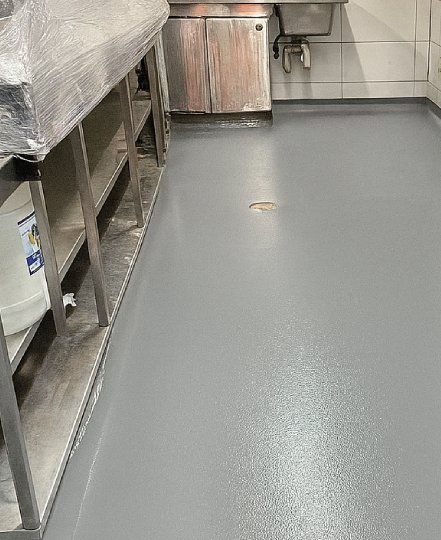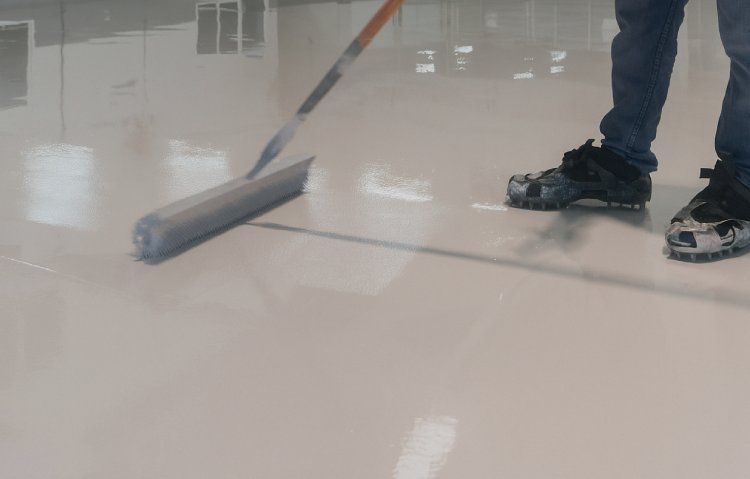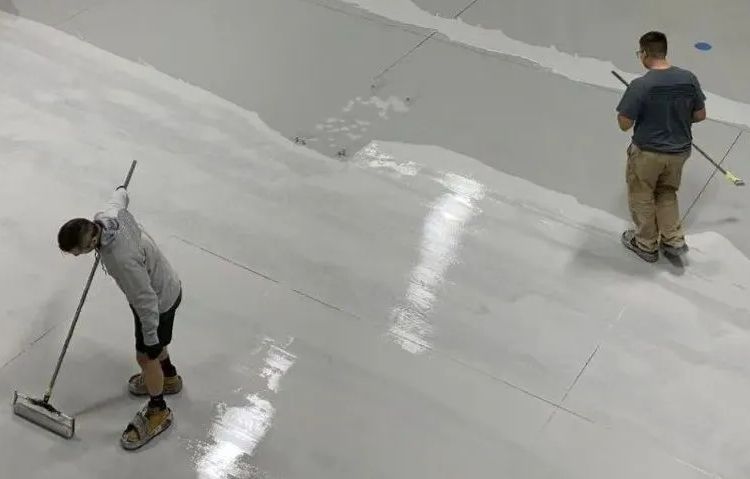Food-Grade Epoxy Coatings: The Essential Flooring Solution For Commercial Kitchens And Food Processing Facilities
Food-grade epoxy coatings represent the gold standard for flooring solutions in commercial kitchens, processing facilities and food industry operations where safety and sanitation cannot be compromised. Unlike traditional flooring, which can trap bacteria in cracks and porous surfaces, these special coatings create a smooth floor. This flooring meets strict FDA and USDA standards and can handle the tough conditions of food processing environments.
These industrial coatings form a
non-porous, chemical-resistant surface that prevents contamination and simplifies cleaning. Its seamless installation prevents cracks where bacteria can grow. This ensures cleanliness and meets food safety standards.
Choosing the right flooring impacts your operation’s efficiency and safety.
Food-grade epoxy coatings resist heat, chemicals and heavy traffic while offering
slip-resistant protection in wet, high-demand environments.

Industrial Food-Grade Epoxy Coatings: Strength, Safety and Sanitation in Every Layer
When it comes to food production, flooring isn’t an afterthought—it’s your first defense against contamination.
Industrial food-grade epoxy coatings offer the durability and hygiene your operation demands.
What Sets Food-Grade Epoxy Apart from Ordinary Coatings
Food-grade epoxy is better than standard floor paints or tiles because it creates a barrier that keeps out bacteria, moisture, and chemicals. This smooth surface has no joints or cracks where germs can grow, making it easier to clean and ensuring it lasts a long time.
Key Benefits:
- FDA-compliant materials for food-contact areas
- Chemical, abrasion, and impact resistance
- Antimicrobial epoxy technology for hygiene control
- Slip-resistant finishes for worker safety
- Seamless design preventing dirt accumulation

The Immediate Advantages You’ll Notice
After installing food-grade epoxy flooring, operations improve. It is easier to clean, meets safety standards and lasts for a long time.
Core Benefits Include:
- Faster, easier cleaning routines
- Compliance with USDA, FDA, and HACCP standards
- Extended flooring lifespan (up to 20 years)
- Enhanced employee safety and productivity
- Polished, professional aesthetics
(Pro tip:
If your kitchen floor is covered in grease stains, epoxy is the solution you need.)
Ideal Applications for Industrial Food-Grade Epoxy
Epoxy coatings are effective in various industrial settings. They keep areas clean and ensure good performance, even in large facilities.
Best Suited For
- Commercial kitchens and bakeries
- Meat, poultry, and dairy processing facilities
- Beverage bottling and canning plants
- Industrial freezers and storage units
- Food packaging and testing labs
Commercial Epoxy Flooring: Where Cleanliness Meets Compliance
In food service and production, every surface is important for ensuring quality.
Commercial epoxy flooring is both durable and hygienic. It helps meet health regulations and looks good at the same time.
Why Food Processing Facilities Depend on Epoxy Flooring
Food production environments require chemical-resistant, easy-to-sanitize surfaces. Epoxy coatings seal concrete against oils, sugars and cleaning solutions—preventing contamination while maintaining a spotless appearance.
Advantages Include
- Meets FDA and USDA flooring requirements
- Withstands temperature swings and thermal shock
- Prevents microbial growth and cross-contamination
- Supports HACCP sanitation protocols
Cost and Value of Food-Grade Epoxy Flooring
When budgeting for epoxy flooring, factor in the area size, surface preparation and coating type. On average, costs range between $5 and $12 per square foot, depending on facility needs and finishes. This investment delivers exceptional durability, hygiene and long-term savings—helping your operation maintain regulatory compliance while enhancing safety and performance.
Cost Influencers
- Surface Prep: Crack repair and grinding requirements
- Facility Needs: Antimicrobial or chemical-resistant layers
- Regulations: FDA and USDA compliance standards
- Project Scale: Larger areas lower per-square-foot cost

Professional Installation and Maintenance Advantages
Hiring certified epoxy contractors guarantees that your flooring will meet all necessary standards.
Expect:
- Precise installation and preparation
- Tailored coatings for your facility type
- Low-maintenance, high-gloss finishes
- Slip-resistant, sanitary surfaces
Frequently Asked Questions
Food-grade epoxy coatings involve specific performance standards, installation requirements and regulatory compliance factors. These systems address durability expectations, safety features, cost considerations and certification requirements for commercial food service applications.
What are the advantages of using food-grade epoxy coatings in commercial kitchen flooring?
Food-grade epoxy creates a seamless, non-porous surface that prevents bacteria growth and contamination. The coating resists grease, oils, and cleaning chemicals commonly used in commercial kitchens.
These systems eliminate grout lines and seams where dirt and bacteria typically accumulate. We've seen facilities reduce cleaning time by 40-60% compared to traditional tile floors.
The surface withstands heavy foot traffic, equipment movement, and frequent washdowns. Food-grade epoxy maintains its integrity under temperature fluctuations from hot cooking areas to cold storage zones.
Chemical resistance protects against acids, sanitizers, and harsh cleaning agents used daily in food preparation. This resistance prevents floor deterioration and maintains food safety standards.
How does anti-slip commercial kitchen flooring enhance safety in food preparation areas?
Anti-slip epoxy incorporates texture additives or specialized topcoats that increase surface friction. These features reduce slip hazards in wet conditions common to commercial kitchens.
The textured surface maintains traction even when exposed to oils, water, and food spills. We typically recommend specific slip-resistance ratings based on your facility's wet conditions.
Proper anti-slip flooring reduces workplace injuries and associated insurance costs. The texture design allows effective cleaning while maintaining safety performance.
Different texture levels accommodate various kitchen zones from dry prep areas to wet dishwashing stations. We match texture specifications to your operational requirements.
What factors influence the cost of epoxy flooring for commercial kitchens?
Floor preparation requirements significantly impact project costs. Concrete repair, grinding and cleaning add to base installation expenses.
Surface area and layout complexity affect material usage and labor time. Complex layouts with multiple drains and equipment bases require additional cutting and fitting work.
Coating thickness and system type determine material costs. Heavy-duty food processing areas need thicker applications than standard dining areas.
Regulatory compliance features like antimicrobial additives and specialized topcoats increase material expenses. We factor these requirements into project estimates based on your facility needs.
What criteria determine if a floor surface is acceptable for a food service kitchen?
FDA regulations require smooth, easily cleanable surfaces that resist absorption. The flooring must withstand repeated cleaning and sanitizing procedures without deteriorating.
Surfaces cannot have cracks, crevices, or joints that harbor bacteria or debris. We ensure seamless installation that eliminates potential contamination points.
The floor must resist common food industry chemicals including acids, oils, and sanitizers. Temperature resistance prevents cracking from thermal shock in cooking areas.
Local health departments may have additional requirements beyond federal standards. We verify compliance with all applicable codes before project commencement.
How long can you expect food-grade epoxy flooring to last in a commercial setting?
Properly installed food-grade epoxy typically lasts 10-20 years in commercial food service environments. Heavy industrial food processing facilities may see 8-15 years depending on operational intensity.
Taking care of your flooring can make it last longer. We recommend following specific cleaning steps and doing regular inspections to keep it in good shape.
High-traffic areas like dishwashing stations may require touch-ups after 5-7 years. These localized repairs maintain system integrity without full replacement.
Temperature extremes, chemical exposure frequency, and cleaning practices affect longevity. We assess these factors during system selection to optimize performance expectations.
What certifications should epoxy flooring meet to be considered food-grade and compliant with food service regulations?
FDA approval confirms that our materials meet federal standards for food contact. We use only resins and additives that comply with FDA rules in our food service products.
USDA compliance covers specific requirements for meat and poultry processing facilities. These standards address cleanability and antimicrobial performance.
NSF certification validates materials for direct and indirect food contact applications. This certification covers both flooring materials and installation procedures.
Local health departments may need extra paperwork for approvals. We work with regulatory agencies to make sure we follow all rules before starting installation.
Contact Us Today
Don’t let outdated or unsanitary flooring threaten your food safety standards or productivity.
Schedule your consultation for food-grade epoxy flooring today. This will help make your workspace compliant, hygienic and durable.
Our certified epoxy specialists are ready to design a flooring system that enhances safety, efficiency and visual appeal.
Your facility deserves flooring that performs flawlessly—let’s make it happen.


